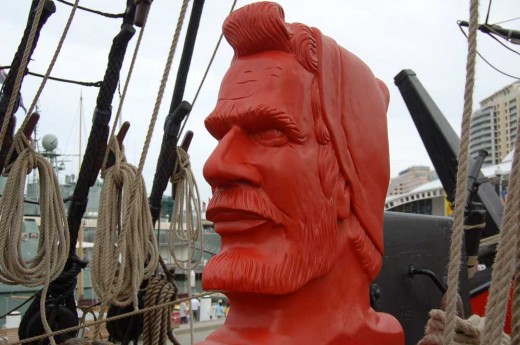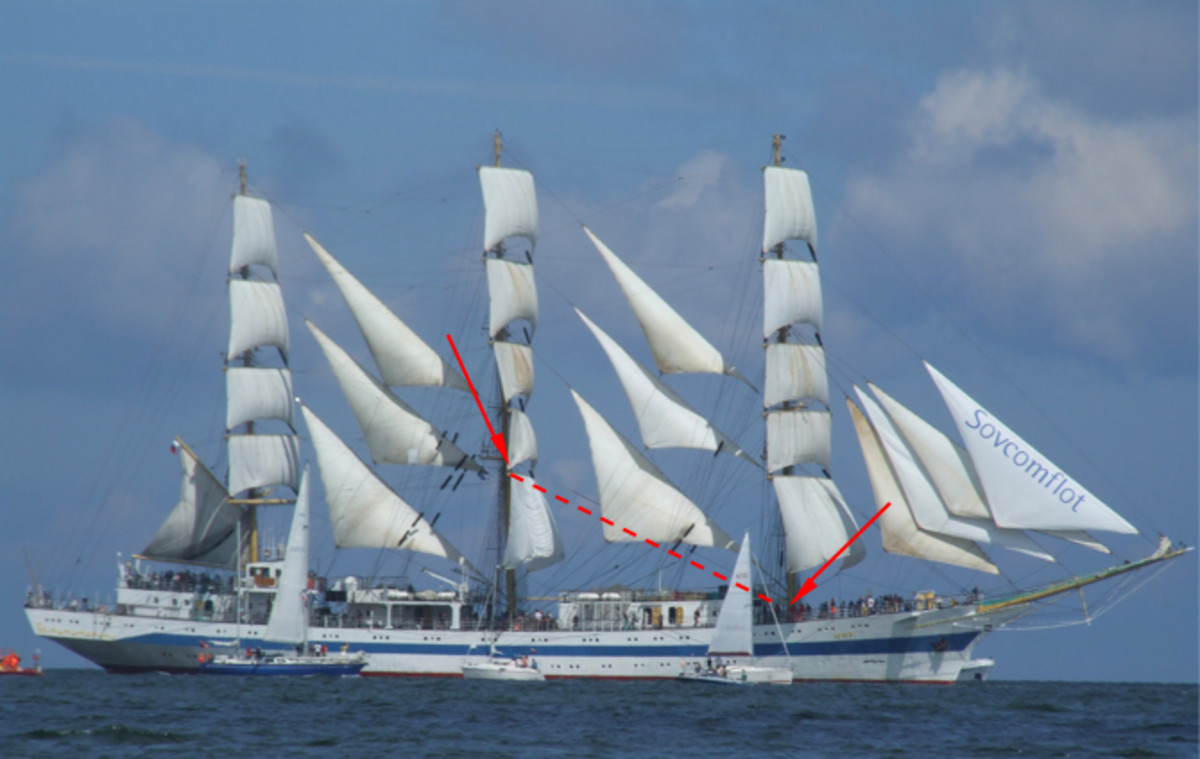Some Common Phrases and their Nautical Origins

- A Square Meal - In good weather, crews' mess was a warm meal served on square wooden platters.
- Above Board - Anything on or above the open deck. If something is open and in plain view, it is above board.
- As the Crow Flies - When lost or unsure of their position in coastal waters, ships would release a caged crow. The crow would fly straight towards the nearest land thus giving the vessel some sort of a navigational fix. The tallest lookout platform on a ship came to be know as the crow's nest.
- At Loggerheads - An iron ball attached to a long handle was a loggerhead. When heated it was used to seal the pitch in deck seams. It was sometimes a handy weapon for quarrelling crewmen.
- Back and Fill - A technique of tacking when the tide is with the ship but the wind is against it.
- Bear Down - To sail downwind rapidly towards another ship or landmark.
- Between the Devil and the Deep Blue Sea - The devil seam was the curved seam in the deck planking closest to the side of the ship and next to the scupper gutters. If a sailor slipped on the deck, he could find himself between the devil and the deep blue sea.
- Booby Hatch - Aboard ship, a booby hatch is a sliding cover or hatch that must be pushed away to allow access or passage.
- Buoyed Up - Using a buoy to raise the bight of an anchor cable to prevent it from chafing on a rough bottom.
- By and Large - Currently means in all cases or in any case. From the nautical: by meaning into the wind and large meaning with the wind: as in, "By and Large the ship handled very well."
- Chock-a-block - Meaning something is filled to capacity or over loaded. If two blocks of rigging tackle were so hard together they couldn't be tightened further, it was said they were "Chock-a-Block".
- Cut and Run - If a captain of a smaller ship encountered a larger enemy vessel, he might decide that discretion is the better part of valor, and so he would order the crew to cut the lashings on all the sails and run away before the wind. Other sources indicate "Cut and Run" meant to cut the anchor cable and sail off in a hurry.
- Cut of His Jib - Warships many times had their foresails or jib sails cut thinly so that they could maintain point and not be blown off course. Upon sighting thin foresails on a distant ship a captain might not like the cut of his jib and would then have an opportunity to escape.
- Dressing Down - Thin and worn sails were often treated with oil or wax to renew their effectiveness. This was called "dressing down". An officer or sailor who was reprimanded or scolded received a dressing down.
- First Rate - Implies excellence. From the 16th century on until steam powered ships took over, British naval ships were rated as to the number of heavy cannon they carried. A ship of 100 or more guns was a First Rate line-of-battle ship. Second rates carried 90 to 98 guns; Third Rates, 64 to 89 guns; Fourth Rates, 50 to 60 guns. Frigates carrying 20 to 48 guns were fifth and sixth rated.
- Fly-by-Night - A large sail used only for sailing downwind and requiring rather little attention.
- Footloose - The bottom portion of a sail is called the foot. If it is not secured, it is footloose and it dances randomly in the wind.
- Garbled - Garbling was the prohibited practice of mixing rubbish with the cargo. A distorted, mixed up message was said to be garbled.
- Give (someone) a Wide Berth - To anchor a ship far enough away from another ship so that they did not hit each other when they swung with the wind or tide.
- Gone By the Board - Anything seen to have gone overboard or spotted floating past the ship (by the board) was considered lost at sea.
- Groggy - In 1740, British Admiral Vernon (whose nickname was "Old Grogram" for the cloak of grogram which he wore) ordered that the sailors' daily ration of rum be diluted with water. The men called the mixture "grog". A sailor who drank too much grog was "groggy".
- In the Offing - Currently means something is about to happen, as in - "There is a reorganization in the offing." From the 16th century usage meaning a good distance from shore, barely visible from land, as in - "We sighted a ship in the offing."
- Leeway - The weather side of a ship is the side from which the wind is blowing. The Lee side is the side of the ship sheltered from the wind. A lee shore is a shore that is downwind of a ship. If a ship does not have enough "leeway" it is in danger of being driven onto the shore.
- Let the Cat Out of the Bag - In the Royal Navy the punishment prescribed for most serious crimes was flogging. This was administered by the Bosun's Mate using a whip called a cat o' nine tails. The "cat" was kept in a leather or baize bag. It was considered bad news indeed when the cat was let out of the bag. Other sources attribute the expression to the old english market scam of selling someone a pig in a poke(bag) when the pig turned out to be a cat instead.
- No Great Shakes - When casks became empty they were "shaken" (taken apart) so the pieces, called shakes, could be stored in a small space. Shakes had very little value.
- No Room to Swing a Cat - The entire ship's company was required to witness flogging at close hand. The crew might crowd around so that the Bosun's Mate might not have enough room to swing his cat o' nine tails.
- Over the Barrel - The most common method of punishment aboard ship was flogging. The unfortunate sailor was tied to a grating, mast or over the barrel of a deck cannon.
- Overbearing - To sail downwind directly at another ship thus "stealing" or diverting the wind from his sails.
- Overhaul - To prevent the buntline ropes from chaffing the sails, crew were sent aloft to haul them over the sails. This was called overhauling.
- Overreach - If a ship holds a tack course too long, it has overreached its turning point and the distance it must travel to reach it's next tack point is increased.
- Overwhelm - Old English for capsize or founder.
- Pipe Down - Means stop talking and be quiet. The Pipe Down was the last signal from the Bosun's pipe each day which meant "lights out" and "silence".
- Pooped - The poop is the stern section of a ship. To be pooped is to be swamped by a high, following sea.
- Press Into Service - The British navy filled their ships' crew quotas by kidnapping men off the streets and forcing them into service. This was called Impressment and was done by Press Gangs.
- Rummage Sale - From the French "arrimage" meaning ship's cargo. Damaged cargo was sold at a rummage sale.
- Scuttlebutt - A butt was a barrel. Scuttle meant to chop a hole in something. The scuttlebutt was a water barrel with a hole cut into it so that sailors could reach in and dip out drinking water. The scuttlebutt was the place where the ship's gossip was exchanged.
- Skyscraper - A small triangular sail set above the skysail in order to maximize effect in a light wind.
- Slush Fund - A slushy slurry of fat was obtained by boiling or scraping the empty salted meat storage barrels. This stuff called "slush" was often sold ashore by the ship's cook for the benefit of himself or the crew. The money so derived became known as a slush fund.
- Son of a Gun - When in port, and with the crew restricted to the ship for any extended period of time, wives and ladies of easy virtue often were allowed to live aboard along with the crew. Infrequently, but not uncommonly, children were born aboard, and a convenient place for this was between guns on the gun deck. If the child's father was unknown, they were entered in the ship's log as "son of a gun".
- Start Over with a Clean Slate - A slate tablet was kept near the helm on which the watch keeper would record the speeds, distances, headings and tacks during the watch. If there were no problems during the watch, the slate would be wiped clean so that the new watch could start over with a clean slate.
- Taken Aback - A dangerous situation where the wind is on the wrong side of the sails pressing them back against the mast and forcing the ship astern. Most often this was caused by an inattentive helmsman who had allowed the ship to head up into the wind.
- Taking the wind out of his sails - Sailing in a manner so as to steal or divert wind from another ship's sails.
- The Bitter End - The end of an anchor cable is fastened to the bitts at the ship's bow. If all of the anchor cable has been payed out you have come to the bitter end.
- The Devil to Pay - To pay the deck seams meant to seal them with tar. The devil seam was the most difficult to pay because it was curved and intersected with the straight deck planking. Some sources define the "devil" as the below-the-waterline-seam between the keel and the the adjoining planking. Paying the Devil was considered to be a most difficult and unpleasant task.
- Three Sheets to the Wind - A sheet is a rope line which controls the tension on the downwind side of a square sail. If, on a three masted fully rigged ship, the sheets of the three lower course sails are loose, the sails will flap and flutter and are said to be "in the wind". A ship in this condition would stagger and wander aimlessly downwind.
- "To Know the Ropes" - There was miles and miles of cordage in the rigging of a square rigged ship. The only way of keeping track of and knowing the function of all of these lines was to know where they were located. It took an experienced seaman to know the ropes.
- "Toe the Line" - When called to line up at attention, the ship's crew would form up with their toes touching a seam in the deck planking.
- "Touch and Go" - This referred to a ship's keel touching the bottom and getting right off again.
- "Under the Weather" - If a crewman is standing watch on the weather side of the bow, he will be subject to the constant beating of the sea and the ocean spray. He will be under the weather.
- "Windfall" - A sudden unexpected rush of wind from a mountainous shore which allowed a ship more leeway.
This content is accurate and true to the best of the author’s knowledge and is not meant to substitute for formal and individualized advice from a qualified professional.





